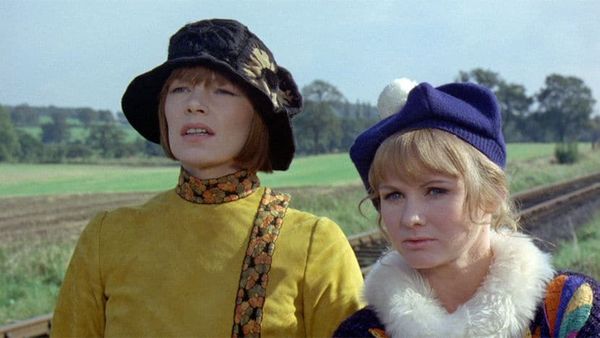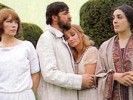Eye For Film >> Movies >> Women In Love (1969) Film Review

It's been four years since Ken Russell died and, from where I’m standing, critical re-evaluation of him has been sadly lacking. The image still remains of a professional provocateur obsessed with titillation and shock for the sake of it, whose best years were long behind him.
Admittedly, a decade or two of low-budget mediocrities and a stint on Celebrity Big Brother didn’t help his cause much. But, if there’s any justice, this restored version of one of his finest two and a bit hours, presented at the London Film Festival, will restore him to his rightful place in the pantheon of top British directors.

It came relatively early in his cinema career, though he’d already been a BBC veteran for more than a decade. He came to it fresh from helming the third and campest of Michael Caine’s Harry Palmer spy adventures, Billion-Dollar Brain. It’s hard to imagine a film more different to that one than Women In Love – except that they’re both clearly the work of a born filmmaker who thought the greatest crime you could commit was boring your audience.
From the opening scene, tracking the Brangwen sisters Gudrun (Glenda Jackson) and Ursula (Jennie Linden) as they leave their house and make their way through a perfectly recreated Nottinghamshire pit village, like two vibrant, beautiful birds bringing colour to their grey surroundings, Russell takes a full-tilt approach to bringing DH Lawrence’s novel alive on screen in all its earthy, sensual – and often ludicrously overblown – glory.
They’re on their way to observe from a distance, a wedding between two of the local gentry, which Russell turns into a gloriously kinetic parade of colour, sound and action. And also uses it to introduce the two men with whom the sisters’ fates will be intertwined – Rupert Birkin (Alan Bates) and Gerald Crich (Oliver Reed).
The two are fast friends, but very different personalities. Rupert, a schools inspector who’s already made a dramatic entrance into Ursula’s life, interrupting her botany lesson to give a discourse on the sexual nature of the catkin, is a freethinking atheist constantly railing against the bourgeois constraints of society - while still enjoying the privileges it has to offer. Gerald, the mineowner’s eldest son who’s engaged in a ruthlessly pragmatic mission to modernise a declining, paternalistic operation, is a force of nature much given to squiring women of low repute and gouging his horse’s flanks as he races it against a train.
A not untypical Lawrence set-up, then, and as the sisters are drawn increasingly into the two men’s orbit, a brace of passionate affairs ensues – frequently punctuated by the characters engaging in what Mrs Merton would no doubt call ‘a heated debate’ on the nature of love and art, the hypocrisy of conventional attitudes to sex, the impossibility of true happiness and other weighty topics.
Some of it is undoubtedly a bit silly – if you ever thought that what cinema was really missing was a scene in which the future MP for Hampstead and Highgate subdues an unruly herd of Highland cattle through the power of dance, look no further – but most of the preposterousness is Lawrence, rather than Russell.
And it’s the price you pay for the film and the book’s strongest point – its detailed evocation of a Midlands mining town in the early years of the last century. Russell, and screenwriter Larry Kramer, move the action of the novel forward to the Twenties (when the book was published), giving the opportunity for some poignant, but angry, scenes where the town’s war memorial is unveiled and Rupert rails against the complacent priest and the disabled veterans hymning the praises of the system that has maimed them.
I doubt Lawrence would have complained at that – and he’d surely have approved of Russell’s other great set pieces; a satirical interlude where Rupert’s soon-to-be ex fiancée Hermione stages a ludicrous ballet ‘in the Russian Style’; a miners’ picnic day at the big house, which brings the four lovers together and veers suddenly from comedy to tragedy; a funeral suddenly interrupted by a madwoman’s laughter.
Of course the most famous of these is the nude wrestling scene, where Rupert and Gerald’s homoerotic closeness is given its fullest and freest expression. Like much of the film, it’s wonderfully unrestrained pure cinema, constantly treading the line between the sublime and the ridiculous and (usually) staying on the right side.
But it would be a mistake to think that scene, or the frequent full-frontal nude shots which added to the film’s controversy on its release, are the chief attractions. Far more striking, and lasting, are the images of the sublimely beautiful countryside, contrasting so markedly with the characters’ inner turmoil; the tumultuous shots of the town at night, a rich tapestry of garish light and ragtime tunes uniting a community in a fleeting moment of pleasure; and the perfectly framed scene where a gleaming Rolls-Royce slowly carves its way through a crowd of miners, black with coal dust, respectfully parting to let it pass.
Russell’s well served in all this by his cinematographer Billy Williams, who supervised the restoration and is equally at home bringing out the classic English landscape of the mineowners’ estate (Elvaston Castle in Derbyshire standing in for the Crich family pile) and the brilliant whiteness of the Swiss Alps, where the two couples’ idyllic holiday together turns sour – and ultimately tragic…
And the performances are as top-notch as you’d expect. Jackson is a captivating screen presence; beautiful, independent and intelligent, a striking contrast to Gerald but eventually proving in many ways stronger than him. Linden is equally impressive in her unconditional, but far from uncritical determination to bring some happiness to the eternally questioning Rupert and put up with his pseudo-intellectual chunterings.
As the lad himself, Bates deserves an Oscar just for declaiming those screeds of Grade A Lawrentian gibberish with a straight face. But he also brings some sympathy to a conflicted but essentially decent character, displaying the same natural screen presence he showed in those other great literary adaptions of the period – Schlesinger’s Far From the Madding Crowd and Joseph Losey’s The Go-Between.
And anyone who thinks Reed was simply a tabloid caricature who only stayed sober long enough to mumble his way through the first take should be made to watch this film. There’s a ton of feral charisma on display here, no doubt, but it’s also a performance of wit, subtlety and – at the last – great poignancy.
There’s an impressive roster of supporting turns too; Eleanor Bron’s ludicrously smug and pretentious Hermione; Alan Webb bringing a quiet dignity to his role as the dying paterfamilias; and Vladek Sheybal, best known as the icy chess master Bond villain in From Russia With Love, seizing an opportunity to play something other than Nazis and KGB officers; his avant-garde artist, wintering in Switzerland, is a wonderfully camp but sinister presence, driving a sizeable wedge into all the principal relationships.
There are a few moments in its 131 minutes where you’ll want the protagonists to shut up and lighten up a bit. But as a recreation of a world less than 100 years old but very different from ours, and a reminder of a time when film-makers weren’t afraid to tackle serious matters full-on Women In Love is a valuable work.
And like all Ken’s movies, it’s a cracking story too. Equally loving restorations of his great artist biopics Savage Messiah, Mahler and The Music Lovers forthwith, please. Not to mention his masterpiece, The Devils. He probably didn’t give a stuff if he was remembered and respected or not. But he should be.
Reviewed on: 20 Oct 2015



















